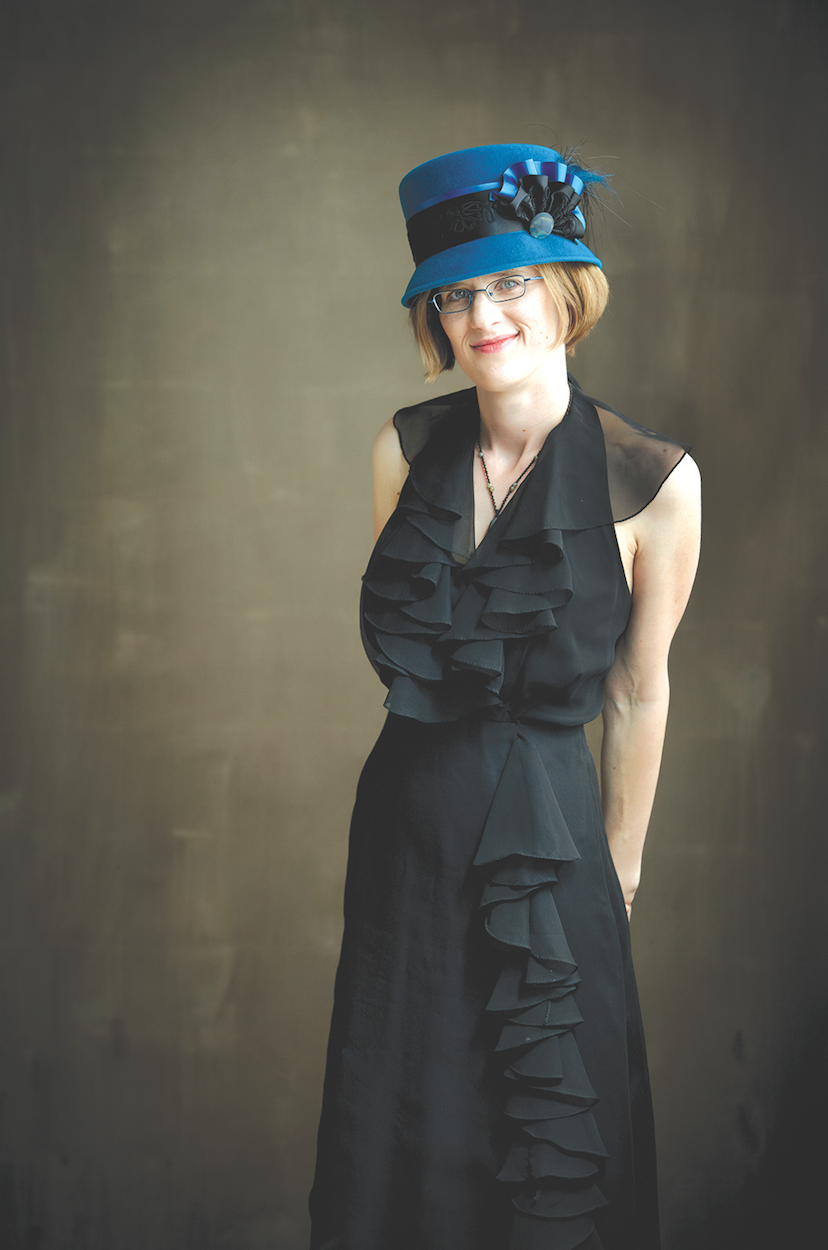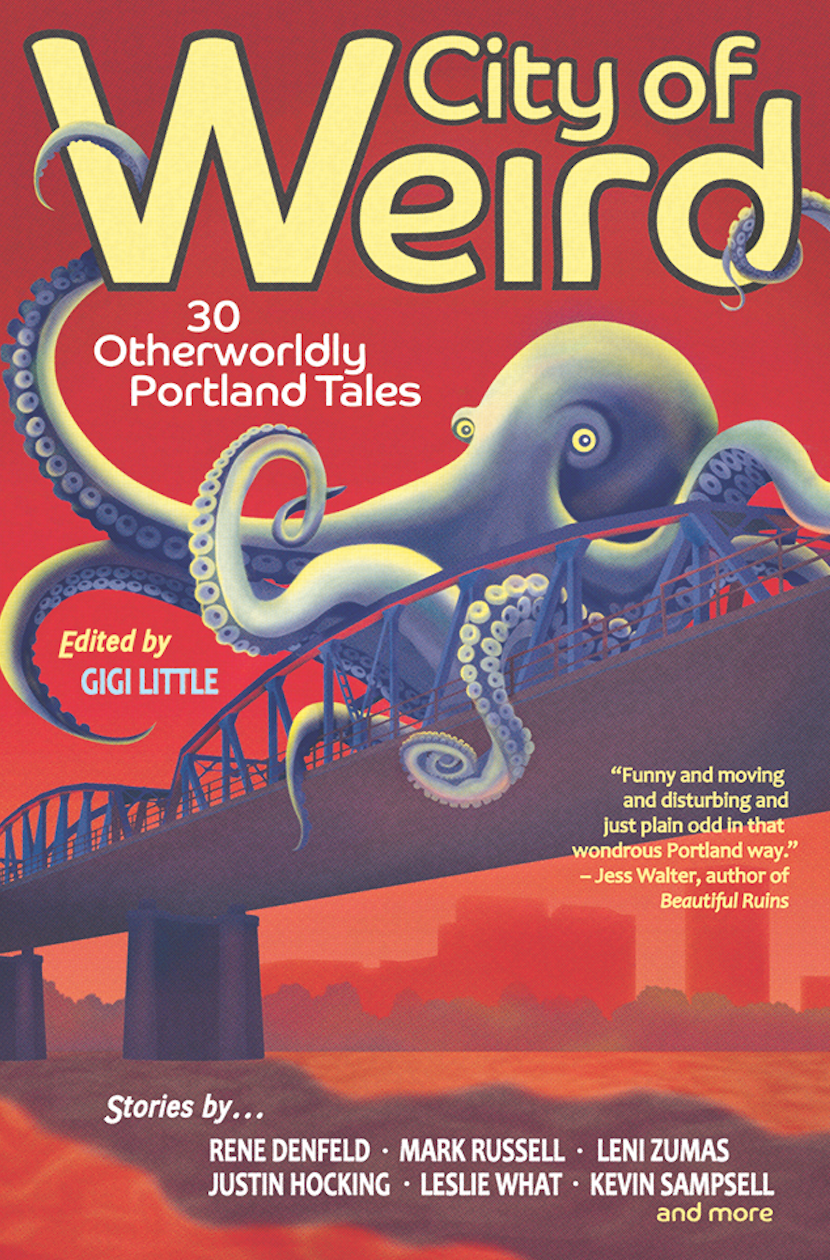Portland writer and publisher Laura Stanfill


Laura Stanfill’s passion for community and books explains why she maintains such an unflinching schedule in a scene to which she gladly devotes her time. When she isn’t busy running Forest Avenue Press, Stanfill nurtures community at the Main Street Writers Movement, participates in several Portland literary organizations and still finds the time to write. Since planting its roots in 2012, Stanfill has grown Forest Avenue Press into the woodland of critically praised fiction it’s known as today.
Her press landed on the national stage in 2015 after publishing Ellen Urbani’s Landfall, an odyssey soaked in the floodwater of Hurricane Katrina. Last year’s City of Weird brought her books back to Portland through a collection of pulp fiction essays written by Kevin Sampsell, Leslie What and others. Both of those releases exemplify the literary joyride of Forest Avenue books and highlight Stanfill’s playful personality as a publisher and cultivator of community.
Eleven: Let’s start with your involvement in the Portland literary scene. Can you give the bullet points of your participation in the community?
Laura Stanfill: For 10 years, I participated in the scene by attending events and buying books. Five years ago, I founded Forest Avenue Press so I could be another home for manuscripts. I joined the Pub West board a year ago, but I am also a member of the Community of Literary Magazines and Presses, The Independent Book Publishers Association, Women in Portland Publishing, and I run happy hours for Portland presses and community members. In February, I started the Main Street Writers Movement as a way to encourage writers to build community at a local level, but we also have hubs across the country. With that project, I want to give writers the tools to build their own communities instead of seeing them stand on the sidelines like I did for so many years.
11: You are also a writer. How is your book going?
LS: I’ve been working on my book for 10 years now—I know! It took me a couple years to find my voice, and what I wanted to do with it. When I started the press, I found myself busy with other writers’ work, so I found it really challenging to work on my own writing instead of sending out five more galleys, or answering emails, or setting up author events when I had other writers counting on me. Now, at five years with the press, it’s time to invest in myself. I’m revising my book, and things are moving along very nicely.
11: When Forest Avenue Press publishes a book, how do you care for it through the publishing process?
LS: Usually I like to have two years of advance time to work with an author. We do all the editing and all of that other stuff in-house. I focus on making sure our authors are as in on the publishing process and how the industry works as I am, so part of it is being transparent to our writers about the industry and what we do as a press. I feel by doing that it makes our writers more excited and feel more supported about who is handling their books. We are in it together, all the way through.
11: Now five years into being a publisher, what is something you didn’t know about publishing before launching your press?
LS: This is my subject, and I can teach others about it by demystifying the process. In the terms of publishing, it all comes back to distribution. A lot of authors—and new publishers—don’t know how influential distributors can be in the terms of getting a book to market. I am over the moon about our distribution, because the sales reps understand our titles, aesthetic, covers, and they know how to sell our books. Before that, I was selling books out of the back of my car until Landfall in 2015.
11: What is something you learned about yourself by becoming a publisher?
LS: It took me a year or more to call myself a publisher because I thought I was making it up as I went along. Part of that has been learning the skills of a publisher and making mistakes but ultimately owning the title of being a publisher. I actually didn’t realize the personal change that came with that, so the sense of confidence I developed from being a publisher has surprised me.
11: Can you name a pivotal moment in the history of your press that took Forest Avenue to the next level?
LS: I was ready to take the press to the next level in order to publish fiction after putting out Brave on the Page in 2012, so I did open submissions for a couple months after that. When Stevan Allred called to ask me if I was willing to consider his manuscript for A Simplified Map of the Real World, I accepted his book, and that changed things for us. And the great thing about that book was that nobody told us we had to do things in a certain way. So, we put a map in the back, and Stevan made a story tree that connected the characters from story to story. We put his graph in the book because we could, and we hired a bookseller to do the illustrations because we could. That was a real revelation.
11: Does Forest Avenue Press originate from a genre or a sound that you strive for as a publisher?
LS: The press came out of our grassroots desire to publish Oregon writers—as much as that is an aesthetic. However, the aesthetic has grown since. I actually remember reaching out to Rhonda Hughes at Hawthorne Books between releasing A Simplified Map of the Real World and The Gods of Second Chances about this, and I asked her, “I put out this book that’s completely different from the next one—what should I do?” Rhonda was able to tell me that I can create a spectrum of taste, and within that spectrum, my tastes in between is what the press represents. She gave me the confidence to figure out where those pieces are. Our aesthetic has shifted a little bit, but we’ve always been interested in story and language.

11: How would you describe a Forest Avenue Press book?
LS: As we’ve grown, I think of our books as being literary fiction on a joyride. There’s this entertaining and fun quality about our titles, and they are paced really well. We have this backyard apple pie aesthetic to our brand too.
11: Landfall is set in New Orleans, while The Hour of Daydreams takes place in the Philippines. Aesthetic aside, it seems like your books are moving beyond the Northwest. Was this decision deliberate?
LS: It’s been thoughtfully curated that way, and we’ve been lucky that we’ve gotten the manuscripts we have. We started out with Stevan’s book that took place in Oregon, and then we went to Alaska, so we were set in the Pacific Northwest for a while. Our next novel, Carry the Sky, takes place in Delaware; Landfall is set in the South during Hurricane Katrina; The Hour of Daydreams is our first book by a non-Oregon writer that’s also not set in the US. So there’s been some movement in our books.
11: What transitioned your books away from the Northwest?
LS: When we got national distribution to support Landfall, I realized we were a regional press, and we had only published Oregon writers. Once we got distribution through Legato Publishers Group, I wanted to open up nationally, and I wanted to look for more stories set outside the Northwest. Landfall was really the shift in that regional-to-national push, but we are still very focused on Oregon writers and the great bookstores we have here.
11: You recently came back to Portland with City of Weird. How did an oddball collection of short stories about Portland develop on a literary fiction platform like Forest Avenue?
LS: I don’t think I would have done this book if I didn’t get a pitch from my cover designer, Gigi Little. In fact, if a straight-up sci-fi pitch came in, I would say, “That’s not part of our brand” and move on. But because Gigi blended this sci-fi supernatural idea into this pulp fiction collection about Portland, she related it to our grassroots Oregon aesthetic. I knew she was going to bring her literary aesthetic into the mix too, so it felt like a great idea.
We were floored by the amount of submissions we received for that book. The writers had to write to a prompt, which was asking a lot from people to spend so much of their time to write a story specifically for this project. In the end, we had some tough decisions about what to include, but I think Gigi did a great job of curating it. I also think part of the magic of that book is that its pulpy weird fiction elements are in a more literary style, so that makes it very fun.
11: Where do you see Forest Avenue Press fitting into the PDX community?
LS: I feel lucky that all of these wonderful presses that existed before I came along reached out to help me with my press. Individuals like Rhonda Hughes at Hawthorne, Cameron Pierce at Lazy Fascist and Kevin Sampsell at Future Tense became mentors and models to me by answering my questions. I also want to inspire people who were on the sidelines like I was for a decade, so I want people to know that they can do this too. Now I see my role as the person who can answer questions for others in our community. I’ve been trying to give that back to the community ever since.»
-Morgan Nicholson



